Melissa Lobos, the lead singer for the dissident band Cachitas Now!, performs at Ciudad de Gatos bar in La Plata, Argentina, on July 28, 2024.
Karla Gachet
disguise caption
toggle caption
Karla Gachet
That is a part of a particular sequence, Cumbia Throughout Latin America, a visible report throughout six nations masking the individuals, locations and cultures that hold this music style alive.
Luciano Rombolá, host of the radio and digital program Cumbia de la Pura, calls Argentine cumbia “the tropical music of the end of the world.” He additionally says that the historical past of this cumbia phenomenon can’t be analyzed with out contemplating migration. Across the Fifties, the College of Buenos Aires welcomed international migrants, who may examine without spending a dime. This attracted many music college students, one in all them Costa Rican Mario Castellón, who shaped a gaggle with two Colombians, a Peruvian and a Chilean to entertain at a marriage. Thus, Los Wawancó was born — one in all Argentina’s most iconic and foundational cumbia bands.

A celebration earlier than a soccer match on the stadium La Bombonerita in Buenos Aires’ La Boca barrio on Aug. 4, 2024.
Karla Gachet
disguise caption
toggle caption
Karla Gachet

The cumbia band Los Seniors carry out at a celebration for a Bolivian household in Gregorio de Laferrère, a metropolis exterior Buenos Aires, Argentina, on Aug. 2, 2024.
Karla Gachet
disguise caption
toggle caption
Karla Gachet
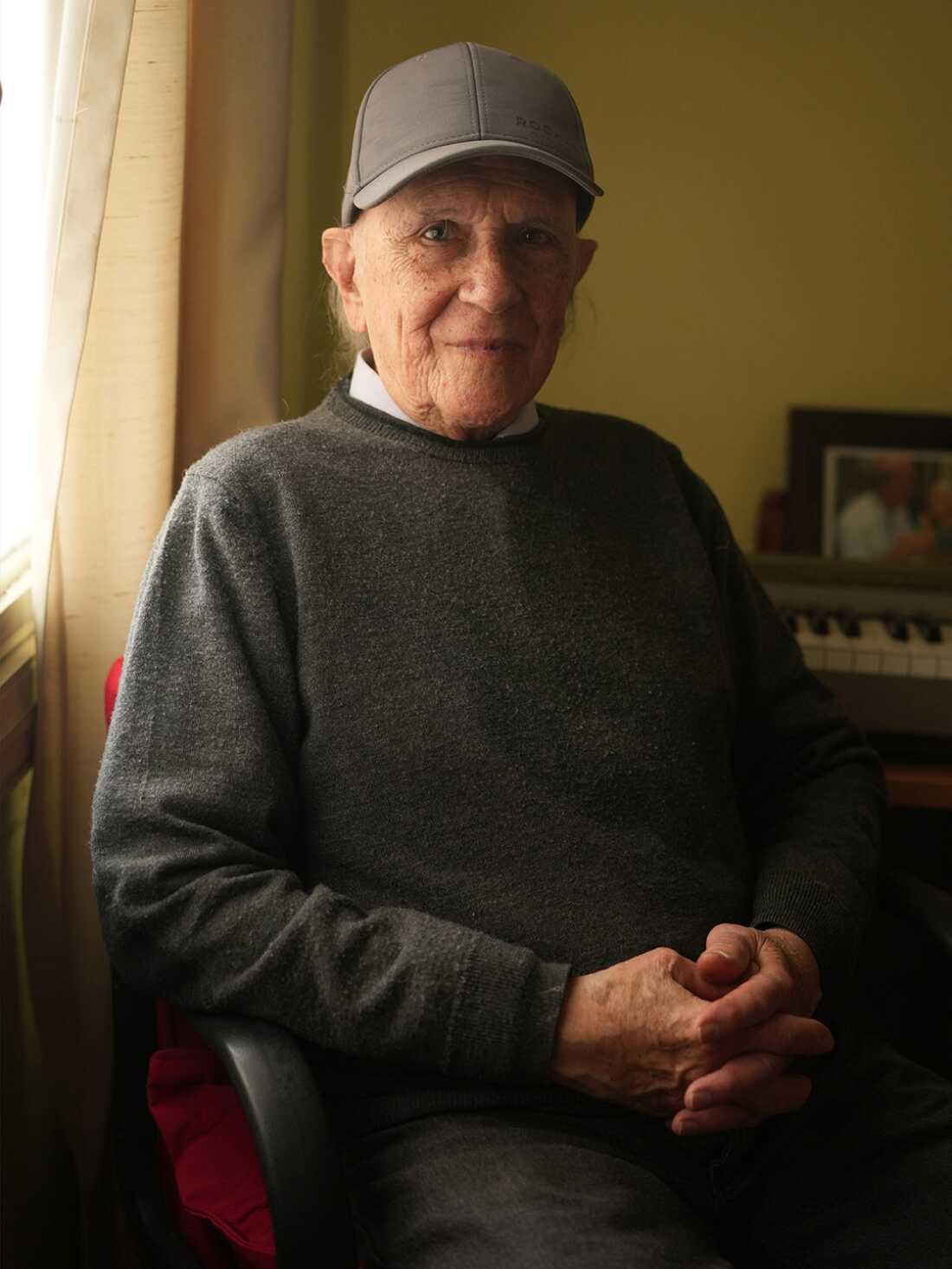
Pianist Miguel Loubet, the final surviving member of Los Wawancó, poses for a portrait on Aug. 1, 2024.
Karla Gachet
disguise caption
toggle caption
Karla Gachet
Through the years, different influences have come to Argentine cumbia, together with — however not restricted to — chicha and huayno tropical from Bolivia, cachaca from Paraguay, cumbia chicheras, chacaloneras and norteñas from Peru and, in fact, Colombian cumbia.
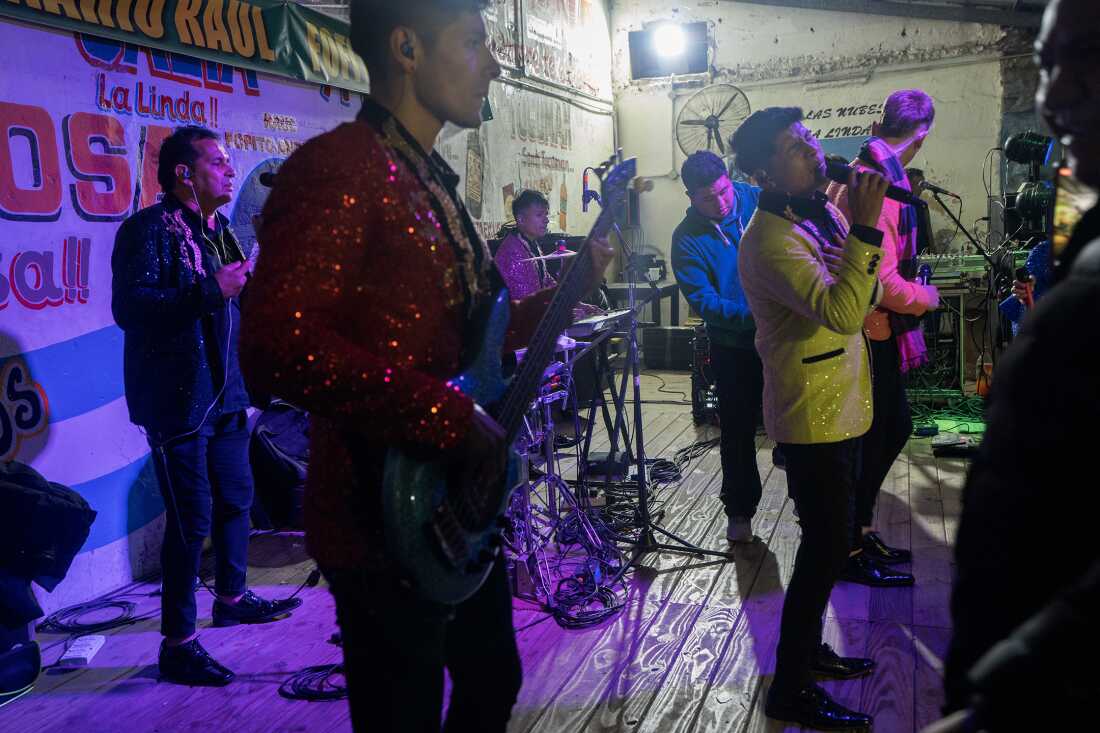
The band Bandy2 performs at La Peña de Mario Ibarra in Buenos Aires’ La Boca barrio on July 28, 2024. The place is full of lovers of northern cumbia.
Karla Gachet
disguise caption
toggle caption
Karla Gachet

Individuals collect at La Peña de Mario Ibarra within the La Boca neighborhood of Buenos Aires to have fun Pachamama Day on Aug. 1, 2024. Members of the Bolivian, Salta and Jujuy communities participate within the conventional Andean ceremony honoring Mom Earth.
Karla Gachet
disguise caption
toggle caption
Karla Gachet
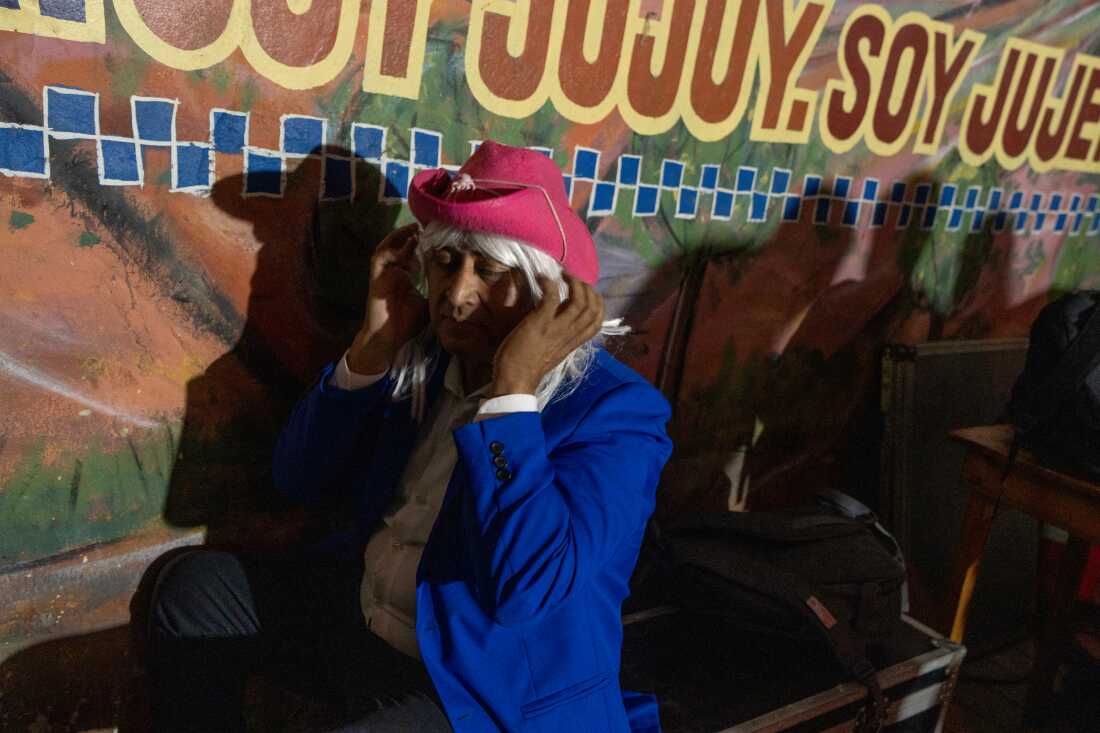
Martin Oropeza, the group entertainer for the band Sabor Karpero, will get prepared for a efficiency on the Peña de Mario Ibarra in Buenos Aires’ La Boca barrio on July 28, 2024.
Karla Gachet
disguise caption
toggle caption
Karla Gachet

Individuals collect for a road occasion in Buenos Aires’ La Boca barrio earlier than a soccer match on the La Bombonerita stadium on July 31, 2024. Pre-game celebrations happen all through the realm, with cumbia bands usually employed to carry out exterior food and drinks institutions.
Karla Gachet
disguise caption
toggle caption
Karla Gachet
Through the army dictatorship that dominated Argentina from 1976 till 1983, many individuals migrated to the capital searching for higher alternatives. That is how the Higher Buenos Aires space was populated, a type of buffer zone between Buenos Aires and the remainder of Argentina the place migrants from different areas and nations discovered inexpensive housing. With the return of democracy within the ’80s, dance golf equipment opened the place communities and their musical teams had their very own house. Many of those venues are known as “bailantas,” initially a pejorative time period as a result of these dance halls have been traditionally related to working-class and marginalized communities of decrease social standing. Nevertheless, the time period has since been reappropriated by cumbia communities. Cumbia has additionally been known as “black” music as a result of it has traditionally been consumed by the working class and migrants.

A view of Maciel Island, a neighborhood in Dock Sud, a city simply exterior Buenos Aires, on Aug. 3, 2024. Cumbia teams from Santa Fe first carried out right here exterior their province, serving to popularize “cumbia santafesina,” a mix of conventional cumbia that includes accordion and guitar.
Karla Gachet
disguise caption
toggle caption
Karla Gachet

Adrián and Deborah Chauque pose for a portrait at their house in Buenos Aires on Aug. 2, 2024. Adrián is the frontman of Adrián y los Dados Negros, a Nineteen Eighties cumbia band that continues to carry out in Argentina and Bolivia.
Karla Gachet
disguise caption
toggle caption
Karla Gachet
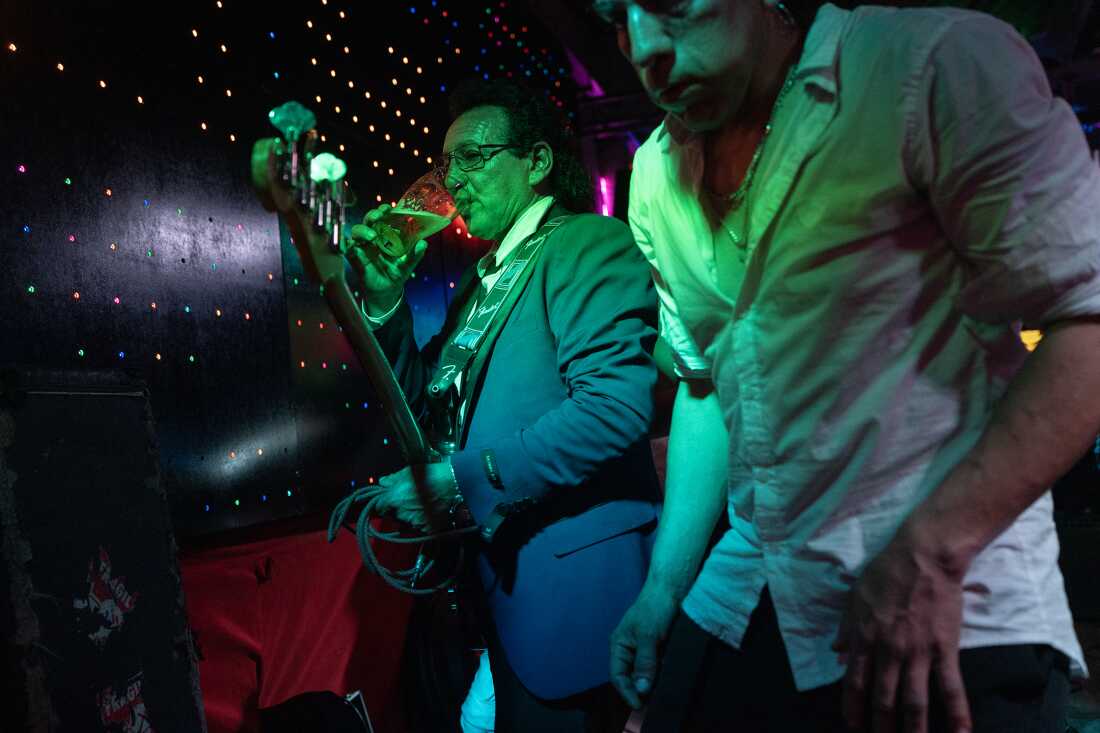
Adrián Chauque y los Dados Negros carry out at El Maza bar in Buenos Aires, Argentina, on Aug. 2, 2024.
Karla Gachet
disguise caption
toggle caption
Karla Gachet

Adrián Chauque is hugged by a fan in El Maza bar in Buenos Aires, Argentina, on Aug. 2, 2024.
Karla Gachet
disguise caption
toggle caption
Karla Gachet

Adrián Chauque y los Dados Negros carry out at a bar in Buenos Aires, Argentina, on Aug. 2, 2024.
Karla Gachet
disguise caption
toggle caption
Karla Gachet
As Argentina’s demographics developed, so has its cumbia, turning into a mirrored image of the varied voices and experiences that form the nation at the moment. Whereas Adrián Chauque and Los Dados Negros enliven events for Bolivians and migrants from northern Argentina at a suburban dance corridor, Rocío Quiroz sings her cumbia villera on Pasión de Sábado, and Cachitas Now!, a dissident band, sings to a university-aged queer viewers in La Plata. Chauque sings the cumbias of outdated, these of affection and heartbreak. Quiroz does too, however with a extra street-oriented tone, and Cachitas Now!, bored with the misogynistic lyrics of many cumbias, determined to place their stamp on it and make the rhythm their very own. Melissa Lobos, Cachitas Now!’s vocalist, says that cumbia “belongs to everyone! We shouldn’t be oblivious to the context we’re in; we can’t have such rigid ideas — cumbia is this and not that. For me, a good cumbia is one that makes me dance or one that has a chorus that makes me sing it out loud.”

Zoe Ailín Banari, Sol Aguirre and Tiara Florencia Banari, followers of Rocío Quiroz, pose for a portrait exterior the studio the place the TV present Pasión de Sábado is filmed in Buenos Aires on July 27, 2024. Quiroz is a daily visitor on the present.
Karla Gachet
disguise caption
toggle caption
Karla Gachet
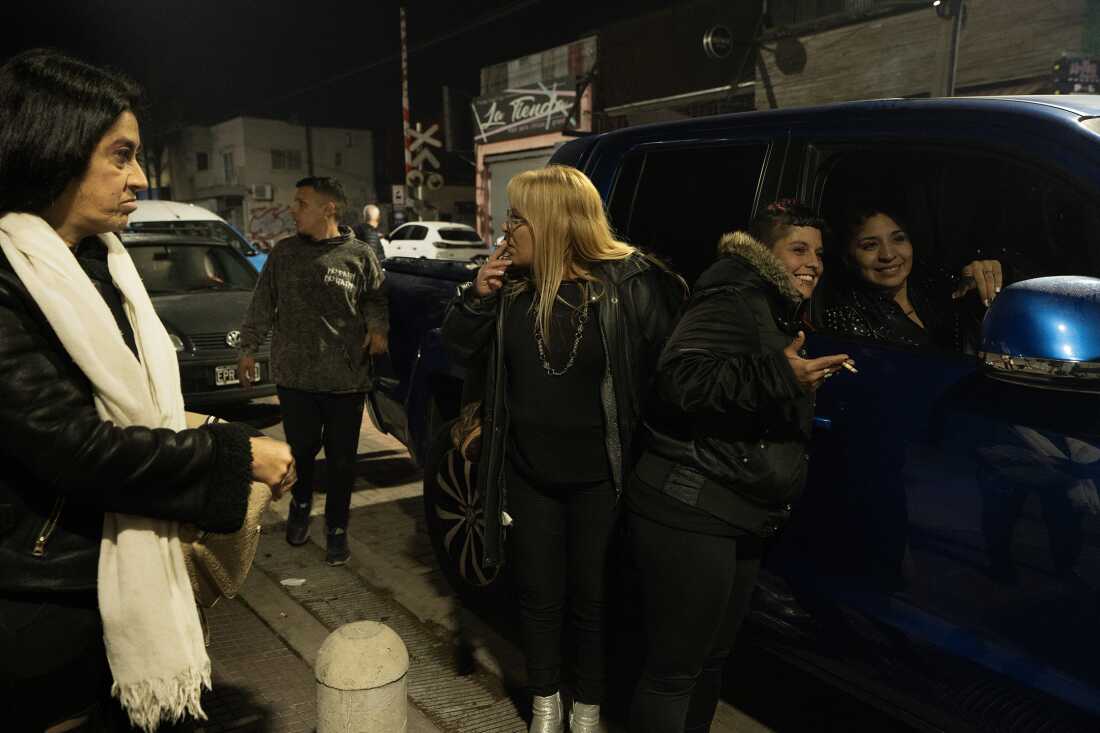
Followers of Rocío Quiroz, a preferred cumbia villera singer, collect to ask for her autograph as she leaves a live performance on July 27, 2024. The present happened within the Conurbano, a suburban space surrounding Buenos Aires the place many migrant communities stay.
Karla Gachet
disguise caption
toggle caption
Karla Gachet

Gisela Ressia poses for a portrait at her house close to Buenos Aires, Argentina, on Aug. 5, 2024. Ressia pays tribute to the late Gilda, a Nineties cumbia singer who died in a automobile accident.
Karla Gachet
disguise caption
toggle caption
Karla Gachet

Gilda, pictured right here on a fan’s T-shirt, grew to become a pagan saint to her followers and an icon of Argentine cumbia.
Karla Gachet
disguise caption
toggle caption
Karla Gachet
The one factor virtually all Argentinians from all social and cultural backgrounds agree on is Gilda. As a kindergarten trainer, she determined to launch into singing regardless of not having the voluptuous physique of different artists of her time. Gilda touched individuals’s hearts by means of her voice, her compositions and the tales informed by her followers, who attributed miracles to her. At the moment, within the Nineties, she was already talking about gender perspective, following your desires and flying excessive. Like lots of her cumbia colleagues who’ve died on the street whereas dashing from one occasion to a different, Gilda died in a site visitors accident and have become the saint of the dance. Gilda is a logo of freedom, and her songs proceed to be carried out all through the continent.
This protection was made with the help of the Nationwide Geographic Society Explorer program.
Karla Gachet is a photojournalist based mostly in Los Angeles. You’ll be able to see extra of Karla’s work on her web site, KarlaGachet.com, or on Instagram at @kchete77.




